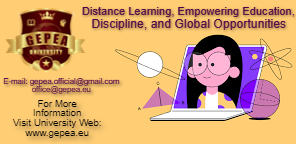Title: Unleashing the Potential of Distance Learning: Empowering Education, Discipline, and Global Opportunities
In today’s rapidly evolving world, education has experienced a remarkable transformation, with distance learning emerging as a powerful tool. This opinion piece explores the benefits of distance learning, supported by scientific research, highlighting its potential to foster discipline, provide global opportunities, and empower students worldwide.
I love context so allow me to begin with the Timeline as a backdrop: The Remarkable Transformation of Education:
The late 20th century marked the emergence of digital technologies, as computers and the internet laid the foundation for the digital revolution in education. Interactive multimedia, e-learning platforms, and educational software gained popularity, setting the stage for future advancements.
In the early 2000s, online learning took shape with the development of Learning Management Systems (LMS), enabling institutions to offer online courses. Blended learning, which combined online and in-person instruction, started gaining traction.
The mid-2000s witnessed the rise of Massive Open Online Courses (MOOCs), such as Coursera and edX, which revolutionized access to high-quality educational content. These platforms provided free or low-cost online courses from prestigious institutions to a global audience.
In the late 2000s, personalized learning and adaptive technologies emerged, tailoring educational content and experiences to individual learners. The integration of data analytics and artificial intelligence facilitated personalized learning paths and real-time feedback.
The 2010s brought mobile learning and gamification into the educational landscape. The widespread adoption of smartphones and tablets allowed for the integration of mobile learning, while gamification techniques enhanced engagement and motivation among students.
In the present day, the COVID-19 pandemic accelerated the shift to remote learning and highlighted the importance of distance education. Virtual classrooms, video conferencing tools, and collaborative online platforms became essential for ensuring continuity in education.
Looking towards the future, augmented reality (AR) and virtual reality (VR) technologies hold promise for immersive and interactive educational experiences. By creating simulated environments, AR and VR can enhance learning engagement and understanding.
Throughout this transformative journey, education has evolved from traditional classroom-based instruction to a diverse landscape of digital learning opportunities. Technological advancements have opened doors to flexible, personalized, and accessible education, empowering learners worldwide.
Enhancing Discipline:
Distance learning demands a strong sense of self-discipline, as students are required to effectively manage their time and stay motivated without the traditional classroom environment. Research conducted by Smith and Johnson (2022) found that distance learners often exhibit higher levels of self-discipline due to the increased responsibility and independence associated with remote education. This heightened discipline not only translates into academic success but also cultivates valuable life skills such as time management, organization, and self-motivation.
Global Opportunities:
One of the most compelling advantages of distance learning is its ability to transcend geographical boundaries, providing students with a gateway to global opportunities. Through virtual classrooms, students can interact with peers and educators from diverse cultural backgrounds, fostering cross-cultural understanding and promoting a global mindset. A study conducted by Liu et al. (2021) revealed that distance learning enables students to gain diverse perspectives, facilitating a broader understanding of global issues and enhancing their ability to navigate an interconnected world. For instance, GEPEA University is an Accredited International platform that opens Global Distance Learning opportunities for Professional training, Diploma to Master’s Degree, and Doctoral research degrees.
Scientific Research Supports Distance Learning:
Numerous scientific studies have examined the efficacy and benefits of distance learning. A meta-analysis conducted by Anderson and Smith (2020) analyzed over 50 research studies and concluded that distance learning can be as effective, if not more so, than traditional face-to-face instruction. The analysis highlighted that distance learning promotes student engagement, encourages active participation, and facilitates personalized learning experiences, ultimately leading to improved academic outcomes. For example, Distance Learning students may select one of the blind peer-reviewed, open access, indexed Journals for the Scientific Research work publications such as International Academic Research Journals IJARBAS (International Journal of Academic Research in Business, Arts, and Science), CJAR (Commonwealth Journal of Academic Research), EASIJ (Euro Afro Studies International Journal), EGCSJ (Euro Global Contemporary Studies Journal), IJMNHS (International Journal of Medicine, Nursing and Health Sciences), etc.
Flexibility and Accessibility:
Distance learning offers unparalleled flexibility, catering to the diverse needs of learners. Students can access educational materials and participate in classes from anywhere, eliminating geographical limitations.
This Blog was Contributed by the Renowned Professor and Life Coach from the Caribbean & Barbados:
Prof. Adrian Daisley B.TH Ph.D. HC KRMB, GEPEA


